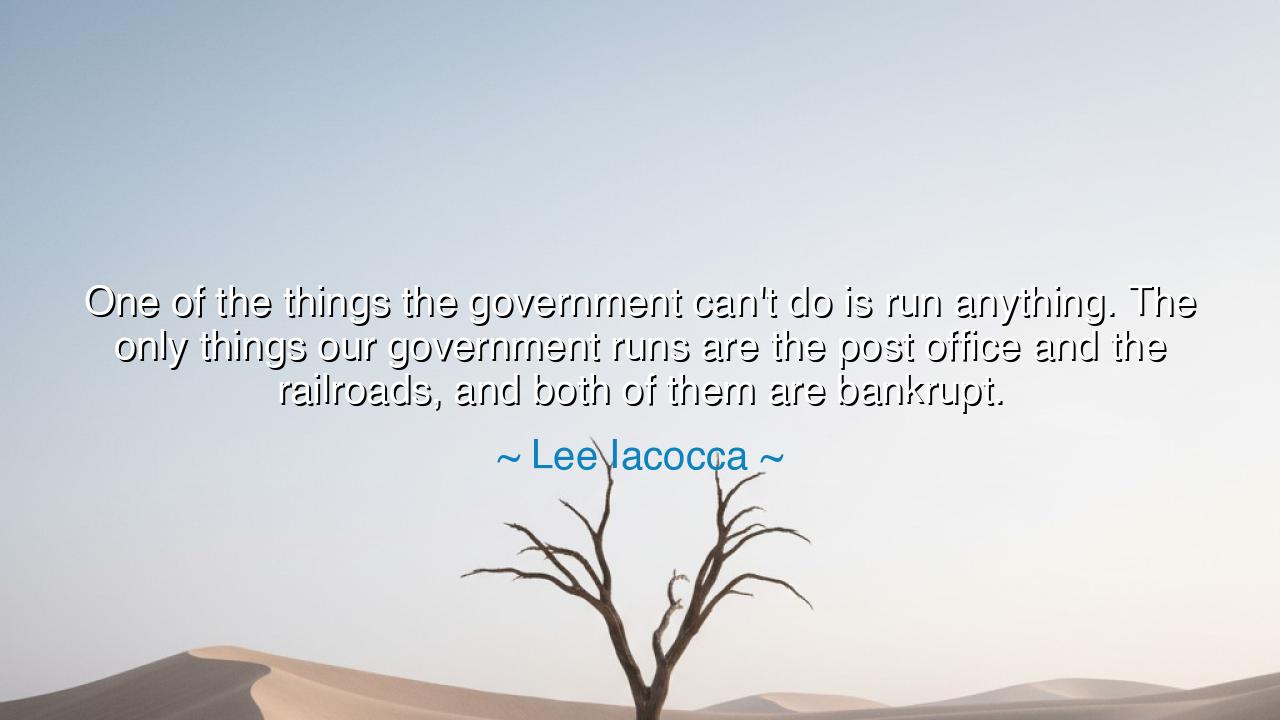
One of the things the government can't do is run anything. The
One of the things the government can't do is run anything. The only things our government runs are the post office and the railroads, and both of them are bankrupt.






Lee Iacocca’s words—“One of the things the government can't do is run anything. The only things our government runs are the post office and the railroads, and both of them are bankrupt.”—echo not merely as a complaint, but as a lament for the loss of efficiency, accountability, and vision that once fueled great enterprises. Spoken by a man who rebuilt Chrysler from near ruin, this quote draws from the wisdom of one who saw firsthand how bureaucracy stifles innovation and how institutions built without the fire of ownership and responsibility often crumble under their own weight. Iacocca, a titan of American industry, understood that the true engines of progress are individual initiative and private stewardship, not the faceless mechanism of the state.
The origin of this sentiment lies deep in the American ethos of self-reliance—the belief that greatness arises from the sweat and daring of the individual, not from decrees written in marble halls. When Iacocca spoke of government inefficiency, he invoked the struggles of the U.S. Postal Service and Amtrak—two entities that, despite noble intentions, became symbols of bureaucratic stagnation. He saw how good intentions without discipline lead to waste, and how programs designed to serve the people often grow to serve themselves instead. His criticism was not of governance itself, but of the illusion that control guarantees success.
To understand this truth, one must remember the tale of Chrysler’s rebirth in the late 1970s. When the automaker teetered on the edge of collapse, it was Iacocca who refused to let it die. He did seek government loans, yes—but unlike bureaucratic operators, he took personal responsibility for repaying them. He slashed costs, inspired his workers, and turned a failing enterprise into a symbol of American resilience. His success was not born of regulation or subsidies, but of vision, accountability, and grit—virtues often lost in vast bureaucratic systems. That is the heart of his message: governments can lend aid, but they cannot replace the spirit that drives excellence.
There is another story, across the sea, that echoes this wisdom. In the early 1980s, Margaret Thatcher undertook the painful process of privatizing many of Britain’s nationalized industries. The railways, steelworks, and mines had all fallen into inefficiency, drained by political meddling and lack of competition. Her actions were divisive and controversial, yet they revived sectors that had long been stagnant. Like Iacocca, she believed that freedom and competition awaken ingenuity, while dependence on centralized control breeds decay. Both leaders, in their own ways, fought against the dulling comfort of bureaucracy to rekindle the spirit of enterprise.
But let us not mistake Iacocca’s words for disdain of all government. His warning is one of balance and vigilance. Government, he knew, is essential for law, justice, and the protection of the common good. Yet when it tries to “run” rather than “regulate,” it overreaches its nature. Just as a teacher should guide but not live the student’s life, so too must government set the framework—but let the people create, build, and prosper. The tragedy comes when citizens forget this truth and look to officials for what only their own courage and labor can achieve.
In a deeper sense, Iacocca’s declaration is also a mirror for the soul. Each of us, in our own lives, must resist the temptation of handing our dreams to others—of waiting for someone else to “run” what we should command ourselves. The bankruptcy he spoke of was not merely financial; it was moral and spiritual—a bankruptcy of initiative, where responsibility fades into dependency. Every person, every family, every nation thrives only when it accepts the burden and glory of self-direction.
The lesson, then, is timeless: what endures is not managed, but inspired. Systems can sustain, but only vision transforms. To live by Iacocca’s wisdom, one must cultivate self-reliance, accountability, and creativity—to build rather than wait, to repair rather than complain, to lead rather than depend.
Practical actions follow naturally from this teaching. Take ownership of your craft; if something fails, do not seek excuses—seek solutions. Where institutions falter, build alternatives. Where systems slow you, innovate around them. And most of all, remember that the most powerful government in your life is not the one in your capital city—it is the one that governs your own mind, your own choices, and your own destiny.






AAdministratorAdministrator
Welcome, honored guests. Please leave a comment, we will respond soon